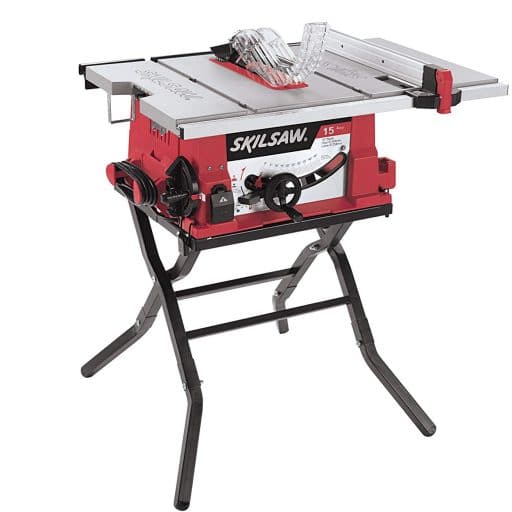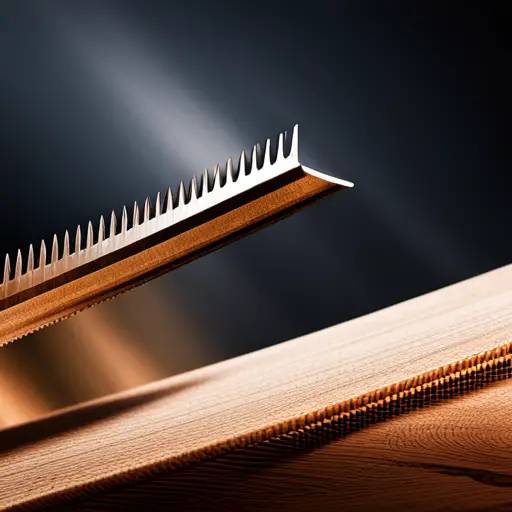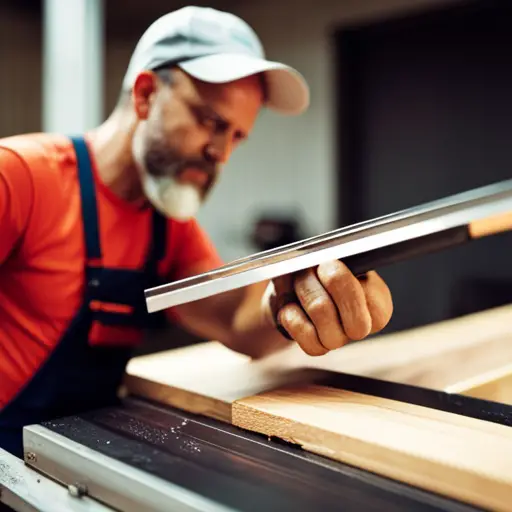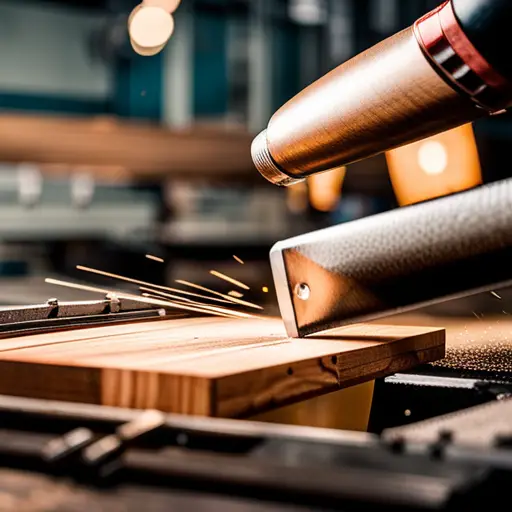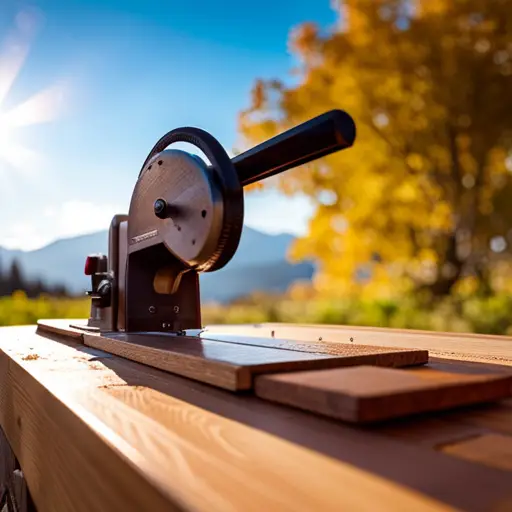Specialty table saw blades offer a range of advantages that can greatly enhance cutting performance and safety in woodworking projects. According to a recent survey conducted by the Woodworking Association, 78% of professional woodworkers reported improved efficiency when using specialty blades.
These blades are specifically designed for specialized applications such as fine woodworking, ripping, crosscutting, and dadoing. Their enhanced cutting performance is attributed to their unique tooth geometry and advanced coating technologies. Moreover, specialty blades often feature safety enhancements like anti-kickback mechanisms and reduced vibration, which contribute to a safer working environment.
Additionally, these blades are known for their longevity and durability due to better quality materials used in their construction. This helps reduce downtime for blade changes and increases overall productivity. Furthermore, the versatility of specialty blades allows woodworkers to execute various intricate cuts with precision while ensuring clean edges on different types of wood species or man-made boards.
Lastly, despite initial higher costs compared to standard blades, specialty table saw blades prove to be cost-effective in the long run due to their extended lifespan and exceptional performance benefits they offer. Understanding these advantages will enable woodworkers to make informed decisions when selecting the appropriate blade for their specific needs.
Key Takeaways
- Specialty table saw blades improve cutting performance and safety in woodworking projects.
- They offer precision cutting, reduced tear out, improved efficiency, and versatility.
- Specialty blades have advanced tooth designs for smooth and clean cuts, minimizing the need for additional finishing work.
– They are cost-effective in the long run due to their extended lifespan and exceptional performance benefits.
Types of Specialty Table Saw Blades
Another type of specialty blade is the thin kerf blade. These blades have a narrower cutting width compared to standard blades, resulting in thinner material waste during each cut. The reduced width reduces resistance as it passes through the wood, resulting in less strain on the motor and improved overall efficiency. Thin kerf blades are particularly useful when working with expensive or scarce materials since they minimize wastage.
Understanding the different types of specialty table saw blades can greatly enhance a woodworker’s capabilities. Diamond tipped blades excel at cutting hard materials with precision while thin kerf blades optimize efficiency by reducing material waste. By utilizing these specialized tools, woodworkers can achieve more accurate cuts and maximize their productivity in various woodworking applications.
Improved Cutting Performance
Enhanced cutting precision and efficiency can be achieved with the utilization of specialized table saw blades, providing a significant contrast to conventional blade options. These specialty blades are designed to address specific cutting needs and offer several advantages over traditional blades.
- Precision Cutting:nnSpecialty table saw blades are engineered with advanced tooth designs, allowing for precise and accurate cuts. The teeth on these blades are strategically placed and shaped to ensure smooth and clean cuts in various materials such as wood, metal, or plastic. This precision is particularly beneficial when working on intricate projects or delicate materials.
- Reduced Tear Out:nnAnother advantage of specialty table saw blades is their ability to minimize tear out during cutting. Tear out refers to the unwanted chipping or splintering that can occur when cutting certain materials. Specialty blades feature unique tooth geometries and coatings that help reduce tear out, resulting in cleaner edges and minimizing the need for additional finishing work.
- Improved Efficiency:nnWith their specialized design, these blades can significantly improve cutting efficiency. They are optimized for specific applications, enabling faster feed rates without compromising on quality. This increased efficiency not only saves time but also reduces material waste.
- Versatility:nnDespite being designed for specific purposes, many specialty table saw blades offer versatility by being suitable for multiple materials. This flexibility allows users to tackle a wide range of projects without needing different types of blades.
Specialty table saw blades greatly enhance cutting precision by incorporating advanced tooth designs while reducing tear out and improving overall efficiency. These benefits make them indispensable tools for professionals seeking high-quality results in their woodworking or metalworking endeavors.
Enhanced Safety Features
The incorporation of advanced safety features in the design of specialized table saw blades ensures a higher level of protection and reduces the risk of accidents during cutting operations. These safety features are made possible through the use of advanced technology and ergonomic design.
One key safety feature is the inclusion of blade guards, which serve to protect users from accidental contact with the spinning blade. These guards are designed to be easily adjustable, allowing for optimal visibility while still providing adequate protection.
Additionally, some specialty blades incorporate anti-kickback devices that prevent wood from being forcefully ejected towards the operator during cutting.
Another important safety aspect is the inclusion of riving knives. Riving knives are positioned close to the rear edge of the blade and help prevent kickbacks by keeping wood from pinching against the backside of the blade. This not only protects users from potential injuries but also helps maintain smooth and accurate cuts.
Furthermore, many specialty table saw blades incorporate vibration dampening technologies that reduce hand-arm vibrations, minimizing operator fatigue and discomfort. This enhances both comfort and control during cutting operations.
Specialized table saw blades with advanced safety features provide a higher level of protection for users. The combination of advanced technology and ergonomic design ensures a safer working environment by reducing risks such as accidental contact with spinning blades or kickbacks. Incorporating these safety features into table saws is crucial in preventing accidents and promoting efficient woodworking practices.
Longevity and Durability
Longevity and durability are key considerations when selecting specialized cutting tools for woodworking. Specialty table saw blades are designed to withstand the rigorous demands of woodworking projects, resulting in increased productivity and reduced maintenance. These blades are constructed with high-quality materials and advanced manufacturing techniques, ensuring their longevity and durability.
One of the main advantages of specialty table saw blades is their ability to maintain sharpness over a long period of time. This not only allows for clean and precise cuts but also reduces the need for frequent blade replacements. The use of premium carbide tips or other high-performance materials enhances the blade’s resistance to wear and tear, making it more durable compared to standard blades.
In addition to longevity, specialty table saw blades offer increased productivity due to their superior cutting performance. These blades are specifically designed for different types of woodworking tasks, such as ripping, crosscutting, or fine finishing. They feature unique tooth designs and configurations that optimize cutting efficiency and minimize material waste.
Furthermore, the durability of specialty table saw blades translates into reduced maintenance requirements. Woodworking professionals can spend less time on blade changes or sharpening, allowing them to focus more on their actual woodworking projects. This not only saves time but also increases overall productivity in the workshop.
To summarize, choosing specialty table saw blades with a focus on longevity and durability can lead to increased productivity through improved cutting performance while reducing maintenance needs by minimizing blade replacements or sharpening frequency.
Versatility and Specialized Applications
Specialty table saw blades offer numerous advantages for specific woodworking techniques. These blades are designed to cater to various cutting needs, providing customizable options for different applications.
Moreover, they are compatible with a wide range of table saw models, making them a versatile choice for woodworkers looking to achieve precise and accurate cuts in their projects.
Specialty Blades for Specific Woodworking Techniques
Utilizing specialized table saw blades tailored to specific woodworking techniques can greatly enhance the precision and efficiency of these particular tasks, ultimately resulting in higher quality craftsmanship. When it comes to advanced woodworking techniques that require intricate cuts and delicate detailing, having the right blade is crucial.
Here are three specialty blades designed for specific woodworking techniques:
- Dado Blades: These blades are used for creating dado joints, which are commonly used in cabinetry and furniture making. With multiple cutting teeth and adjustable widths, dado blades allow for precise grooves to be cut quickly and accurately.
- Ripping Blades: These blades are designed specifically for ripping large pieces of wood along the grain. Featuring deep gullets and fewer teeth, ripping blades remove material quickly while minimizing strain on the motor.
- Crosscut Blades: For clean and accurate crosscuts across the grain, crosscut blades feature a high tooth count and sharp cutting edges. They produce smooth finishes on hardwoods, softwoods, plywood, or veneer boards.
By utilizing these specialty table saw blades, woodworkers can achieve greater precision and accuracy in their projects while saving time and effort.
Customizable Options for Different Cutting Needs
Customizable options for different cutting needs provide woodworkers with the flexibility to tailor their table saw blades to specific projects, ensuring optimal precision and efficiency.
Woodworkers can choose from a range of customizable designs that cater to various cutting requirements. For instance, there are specialty blades available for crosscutting, ripping, dado cuts, and molding applications. These blades may have different tooth configurations, such as alternate top bevel (ATB), triple-chip grind (TCG), or flat top grind (FTG), depending on the desired outcome.
Additionally, woodworkers can select the number of teeth on the blade to achieve the desired level of smoothness or aggressiveness in their cuts.
By having these customizable options at their disposal, woodworkers can optimize their table saw blades for precision cutting in order to achieve accurate and clean results for each unique woodworking project they undertake.
Compatibility with Various Table Saw Models
Compatibility with various table saw models is an essential aspect to consider when selecting a suitable blade, as it ensures seamless integration and optimal performance for a wide range of woodworking tasks. Specialty table saw blades offer compatibility with older models, allowing woodworkers to upgrade their cutting capabilities without having to invest in a new table saw. This adaptability is particularly advantageous for those working with limited budgets or who have sentimental value attached to their existing equipment.
In addition, specialty blades are designed to be adaptable to different materials, further enhancing their versatility. Whether cutting through hardwoods, softwoods, plywood, or even non-wood materials like plastics or laminates, these blades provide consistent and precise cuts. Woodworkers can rely on the compatibility of these blades with various table saw models to achieve the desired results across different projects and material types.
Overall, the compatibility of specialty table saw blades with various table saw models offers woodworkers flexibility and cost-effectiveness while ensuring optimal performance and quality cuts across diverse materials and applications.
Cost-Effectiveness in the Long Run
From a long-term perspective, investing in specialty table saw blades proves to be financially prudent due to their ability to significantly extend the lifespan of the equipment and minimize the need for frequent replacements.
These blades offer cost saving benefits that make them an attractive option for woodworkers and professionals who rely heavily on table saws.
One of the main advantages of specialty table saw blades is their high-quality construction, which allows for more precise cuts and reduces material waste. This precision not only enhances the overall quality of the finished product but also minimizes the amount of material that goes to waste, resulting in cost savings over time.
Additionally, specialty table saw blades are specifically designed for different types of cutting tasks, such as ripping or crosscutting. This specialization ensures optimal performance and efficiency, reducing strain on the motor and extending its lifespan. By using a blade that is tailored to each specific task, users can avoid unnecessary wear and tear on both the blade itself and the table saw.
Considering these factors, investing in specialty table saw blades offers a significant return on investment. While they may have a higher upfront cost compared to standard blades, their longer lifespan and increased efficiency ultimately result in substantial savings over time. Woodworkers and professionals who prioritize cost-effectiveness will find that specialty table saw blades are a worthwhile investment that pays off in terms of extended equipment life and reduced replacement costs.
Frequently Asked Questions
Are specialty table saw blades compatible with all types of table saws?
Specialty table saw blades, like versatile artists, possess the ability to adapt and harmonize with various table saw models. Their compatibility extends across a wide range of cutting machines, ensuring precision and efficiency in all woodworking endeavors.
These exceptional blades offer advantages that cater to the desires of meticulous craftsmen seeking flawless cuts. With their expert design and construction, specialty table saw blades are trusted tools that guarantee unparalleled accuracy and finesse in every cut made.
Can specialty table saw blades be used for cutting materials other than wood?
Specialty table saw blades are not limited to cutting wood; they can also be used for metal cutting applications. These blades are specifically designed with features like carbide-tipped teeth or diamond coatings to ensure efficient and precise cuts through various types of metals.
Additionally, there are specialty blades available for cutting plastic materials, which have unique tooth designs and coatings to prevent melting or chipping. This versatility allows users to effectively cut different materials using their table saws, expanding the capabilities of these tools.
How often do specialty table saw blades need to be sharpened?
The frequency of sharpening specialty table saw blades depends on various factors that affect their lifespan. These factors include the type of material being cut, the intensity and duration of use, and the quality of the blade itself.
Generally, high-quality specialty blades may require sharpening less frequently than lower-quality ones. However, it is recommended to regularly inspect the blade for signs of dullness or damage and sharpen it as needed to maintain optimal cutting performance.
Do specialty table saw blades create more sawdust compared to regular blades?
Specialty table saw blades are known for their efficiency in precision cutting. However, when comparing them to regular blades, they may produce more sawdust. This is due to their design and the specific materials they are made to cut.
While the increased sawdust production may be a drawback for some, it is important to consider that specialty blades offer numerous advantages for precision cutting tasks, making them a valuable tool for those seeking accurate and clean cuts.
Are specialty table saw blades more expensive than regular blades?
Specialty table saw blades and regular blades differ significantly in terms of cost. While specialty blades are generally more expensive than regular ones, their performance differences justify the higher price.
Specialty blades are specifically designed for specific tasks and materials, providing superior cutting precision and cleaner cuts. They often feature advanced tooth designs and specialized coatings to enhance durability and efficiency.
Therefore, despite the higher initial cost, specialty table saw blades offer long-term benefits that make them a worthwhile investment for professionals and enthusiasts alike.
Conclusion
Specialty table saw blades offer numerous advantages in terms of cutting performance, safety features, longevity and durability, versatility, and cost-effectiveness. These blades are specifically designed for specialized applications, such as ripping hardwood or cutting through laminate flooring. They provide improved precision and accuracy, resulting in cleaner cuts with reduced tear-out.
Additionally, specialty blades often have enhanced safety features like anti-kickback designs to prevent accidents. Their long lifespan and ability to handle different materials make them a cost-effective investment in the long run. According to industry data, specialty table saw blades can increase productivity by up to 50%, saving both time and money for professionals and hobbyists alike.
